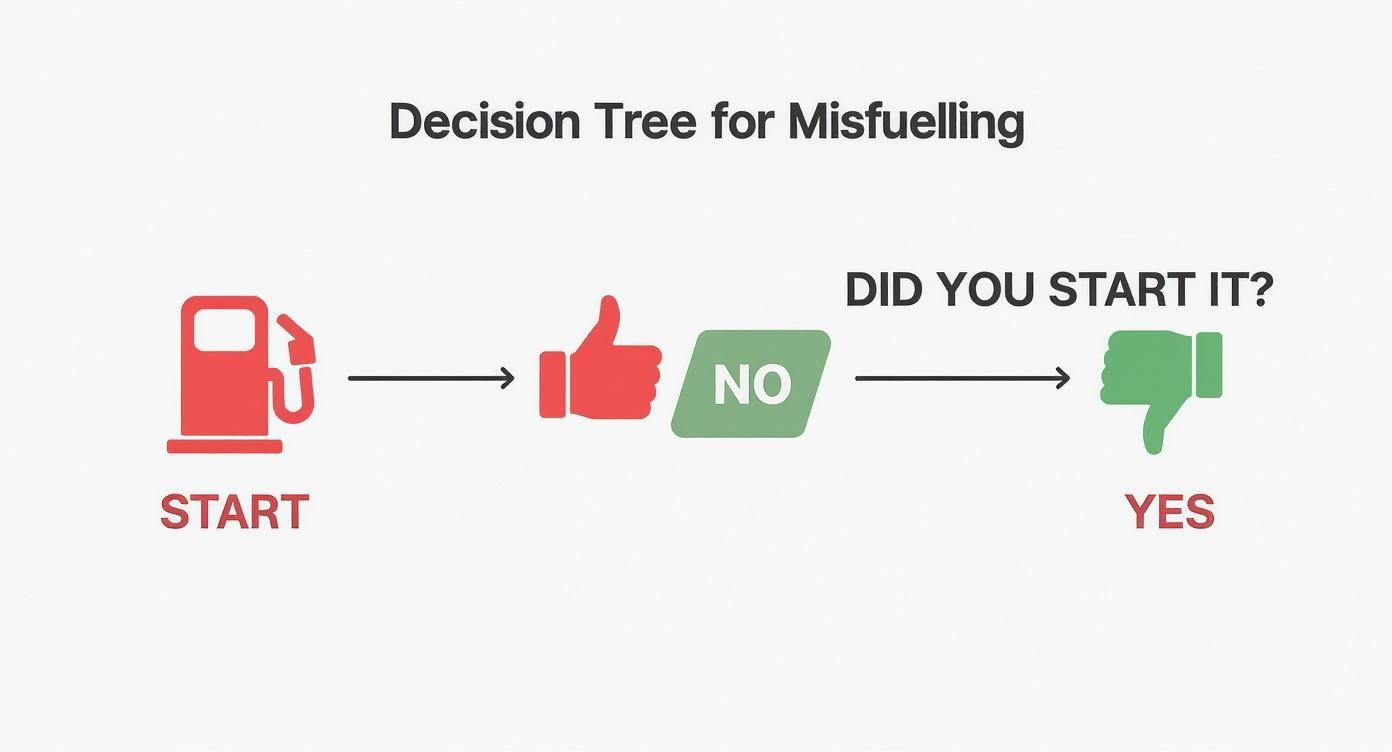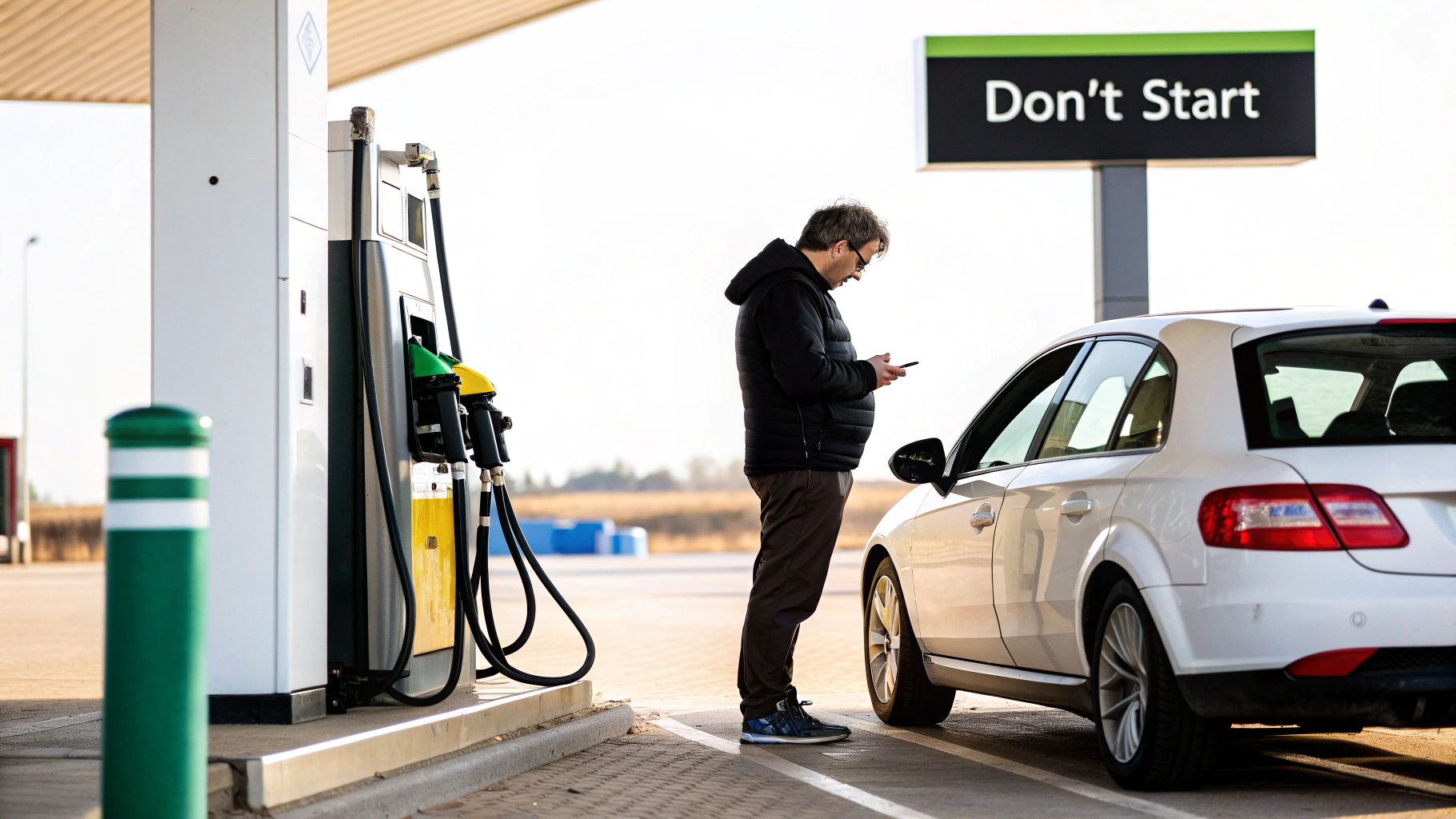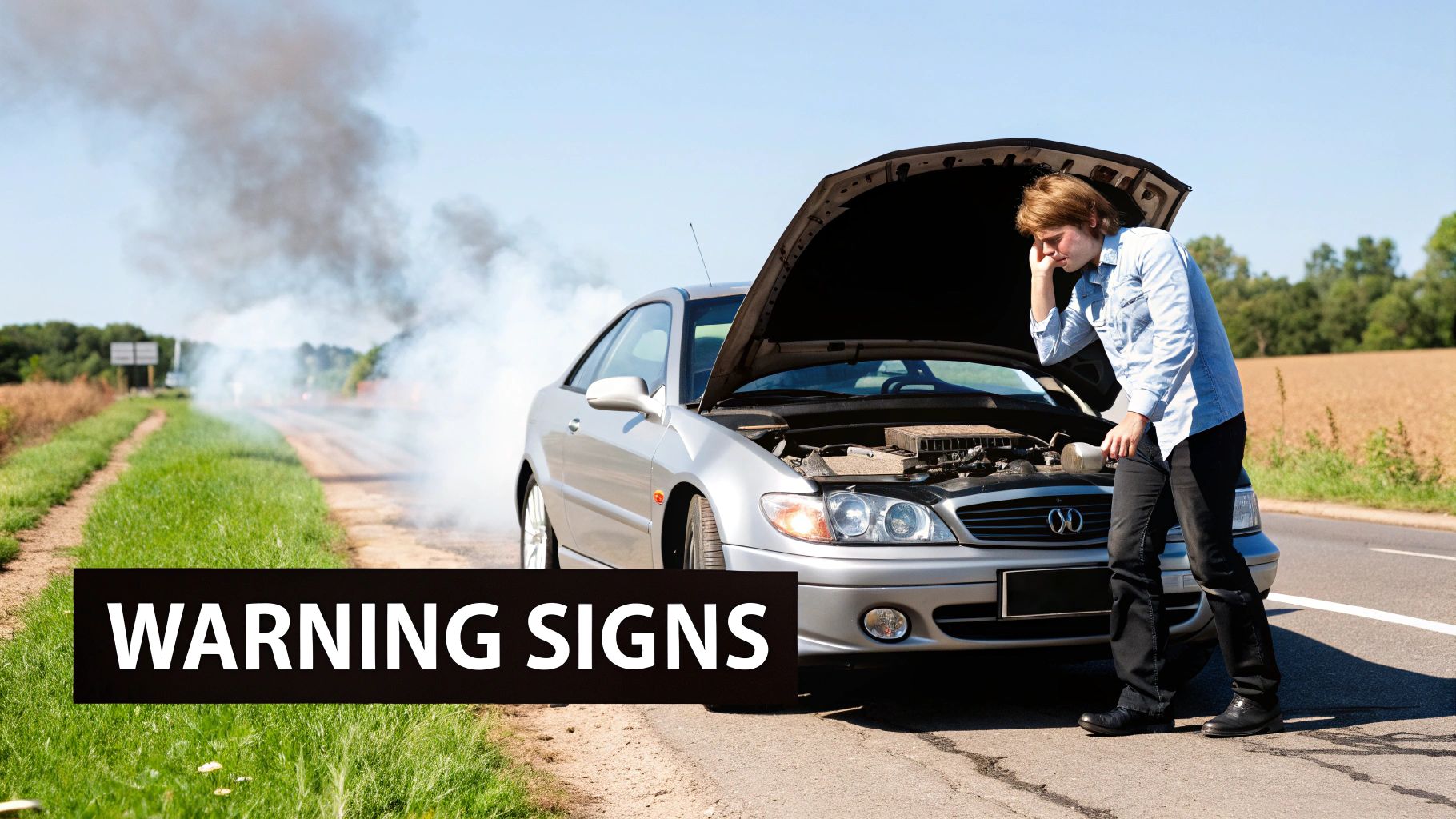Small Amount Petrol in Diesel Car: UK Guide
- Misfuelled Car Fixer

- Nov 1, 2025
- 13 min read
Updated: Jan 28
24/7 Hotline Nationwide: 0330 122 6640
National Wrong Fuel Rescue: https://www.misfuelledcarfixer.co.uk
If you found this page, we cover you!
That sinking feeling hits you right at the pump. You’ve just put a small amount of petrol in your diesel car. The single most critical thing to do right now is absolutely nothing. Don't even put the key in the ignition. Whatever you do, don't start the engine.
Small Amount Petrol in Diesel Car | Your Immediate Misfuelling Action Plan
Catching the mistake before you've started the car is the best possible outcome. It's when that contaminated fuel starts circulating that the real damage begins, so keeping the engine off protects vital components like your fuel pump and injectors. Now's the time to push the panic aside and follow a calm, methodical plan to get this sorted safely.
What to Do Right Now
First things first, pop the car into neutral. If you’re blocking a pump on a busy forecourt, you'll need to move it to a safe parking bay. Get some help to push it – ask the petrol station staff or a fellow driver. It's not just about being considerate; it’s a critical safety measure.
Once the car is somewhere safe, it’s time to call in the professionals. This isn't a DIY job. A mobile fuel drain specialist is your best bet for a fast, on-the-spot fix. When you call, give them your exact location, the car’s make and model, and a rough idea of how much petrol went in.
"The moment you realise you've put petrol in a diesel tank, the clock starts ticking on potential damage. Keeping the engine off is your best defence, turning a potential disaster costing thousands into a manageable fix costing hundreds."
To make it crystal clear, here’s a quick rundown of what you absolutely must—and must not—do in these first few critical moments.
Immediate Misfuelling Do's and Don'ts
Action | Why It's Critical |
|---|---|
DON'T start the engine or turn on the ignition. | This prevents the contaminated fuel from circulating and causing severe, expensive damage. |
DO put the car in neutral. | This makes it possible to move the vehicle without starting it. |
DO push the car to a safe location. | It clears the pump for others and reduces fire risk away from the forecourt. |
DON'T try to drain the tank yourself. | This is dangerous. Fuel is highly flammable, and you need specialist equipment to do it safely. |
DO call a professional fuel drain service. | They have the right tools and expertise to resolve the issue quickly and safely on-site. |
Following these simple steps can be the difference between a minor inconvenience and a major mechanical nightmare.
Understanding the Financial Risk
It doesn't take much. Even a contamination of just 5% petrol is enough to strip away the essential lubricating qualities of diesel fuel, leading to damaging friction and wear on your engine's precision parts.
We see it all the time. Repair bills can start from around £300 for a straightforward fuel drain but can easily soar past £1,000 if the engine has been run. If you want to dig deeper into the consequences, you can learn more about what happens with the wrong fuel in a car.
This infographic clearly shows the two very different paths your situation can take.

The takeaway is simple: what you do in the first few minutes directly dictates the final outcome and, more importantly, the final bill.
Engine On vs. Engine Off: Understanding the Damage

Honestly, the entire outcome of this mess hinges on one simple question: did you turn the key? That single action is the dividing line between a minor inconvenience and a potentially wallet-emptying mechanical failure. These two paths could not be more different.
The Best-Case Scenario: You Kept the Engine Off
If you had that sudden realisation at the pump before you touched the ignition, you can breathe a massive sigh of relief. Well done. You've managed to contain the problem entirely within the fuel tank. The petrol and diesel are mixed up, sure, but they haven't been sucked into the engine's delicate and very expensive fuel system.
When you call a mobile fuel drain service in this situation, the fix is about as straightforward as it gets. It’s a clean, efficient process that stops any damage in its tracks.
Safe Draining: We'll use specialist, ATEX-approved pumping equipment to safely drain the entire tank of contaminated fuel.
System Flush: Next, we'll flush the fuel lines and filter housing to make absolutely certain every last drop of petrol is gone.
Fresh Fuel: Finally, we'll put in a bit of fresh, correct diesel to prime the system and get you ready for a safe restart.
The whole job is usually done and dusted right there on the petrol station forecourt in under an hour. And the best part? Because the engine was never started, there is typically no lasting damage to your vehicle.
By keeping the engine off, you've just swapped a potential four-figure repair bill for a simple, one-off service call. You've saved your fuel pump, injectors, and filters from the destructive effects of the wrong fuel.
The Worst-Case Scenario: You Started the Engine
Starting the car after putting even a small amount of petrol in a diesel car changes everything. The second you turn that key, the fuel pump kicks in, drawing the corrosive mixture from the tank and sending it coursing towards the engine. This is where the real damage starts.
The fundamental problem is that petrol acts as a solvent, stripping away lubrication. Diesel fuel, on the other hand, has an oily quality that is absolutely vital for lubricating high-pressure parts like the fuel pump and injectors. Petrol washes this oily film away, causing damaging metal-on-metal friction and rapid wear. You can learn more about the crucial differences between petrol and diesel fuel in our other article.
The damage caused by running the engine can be severe:
Fuel Pump Failure: Starved of lubrication, the high-pressure fuel pump can quickly destroy itself, often sending tiny metal filings (known as 'swarf') throughout the rest of the fuel system.
Injector Damage: Modern diesel injectors are precision-engineered components. The wrong fuel can cause them to clog, seize, or fail completely.
Blocked Filters: Your fuel filter will try its best to catch the contamination, but it can quickly get clogged, starving the engine of fuel.
If you’ve driven the car, even for a couple of hundred yards, the scope of the repair gets a lot bigger. It's no longer just a simple fuel drain; it's now a full-on diagnostic job that could involve replacing some very costly parts.
Recognising the Warning Signs of Misfuelling
If you’ve driven away from the petrol station without clocking the mistake, it won’t take long for your car to tell you something is seriously wrong. Learning to spot these distress signals immediately can be the difference between a simple roadside fix and a crippling repair bill.
The symptoms often start subtly before becoming impossible to ignore. A diesel engine trying to run on petrol is an unhappy engine, and you'll feel it. You might first notice a lack of responsiveness—the accelerator feels spongy, and the car just won't pick up speed like it normally does. This is often quickly followed by the engine stuttering or misfiring, especially when you try to accelerate.
As that contaminated fuel works its way through the system, the signs get much worse. Your car may start making some unusual noises, like a distinct ‘knocking’ or ‘pinking’ sound. This is a very clear signal that the petrol is igniting too early in the cylinders, a process that can cause significant internal damage if you keep going.
Common Misfuelling Symptoms
When your diesel car starts to protest about having petrol in its tank, the signs are usually quite clear. Keep an eye and an ear out for any of these red flags, because spotting them early gives you the best chance to minimise the damage.
Excessive Exhaust Smoke: You'll likely see an unusual amount of white or grey smoke billowing from the exhaust. This is the engine struggling to burn the wrong fuel.
Loss of Power: The car will feel sluggish and weak. It’ll have a tough time maintaining speed or getting up hills.
Engine Warning Lights: Don't be surprised if your dashboard lights up like a Christmas tree. Expect engine management or emissions warnings as the car's sensors detect the faulty combustion.
Engine Cutting Out: In many cases, the car will eventually lose all power and stall, often refusing to restart.
If you experience any of these symptoms right after filling up, your absolute priority is to pull over safely and turn off the engine. Every second you continue to drive dramatically increases the risk of destroying your fuel pump and injectors.
Why Modern Diesels Suffer So Much
The reason even a small amount of petrol in a diesel car causes such havoc comes down to how modern engines are built. High-pressure common rail systems and sensitive Diesel Particulate Filters (DPFs) are precision-engineered pieces of kit.
Petrol acts like a solvent, stripping away the lubricating properties of diesel fuel. This causes metal-on-metal friction and rapid wear in those delicate, high-pressure components.
Beyond the mechanical harm, there's a real environmental impact. A misfuelled diesel engine can temporarily increase harmful nitrogen oxide (NOx) emissions by up to 30%, contributing to poor local air quality. Since road transport is already a major source of roadside NOx pollution in the UK, it adds another layer of consequence to a simple mistake. You can learn more about the health impacts of diesel vehicle emissions.
So, acting fast isn't just about saving your engine; it's about protecting the air we all breathe.
The DIY Fuel Drain vs Calling a Professional

When you're stood on the forecourt after putting a small amount of petrol in a diesel car, the thought of trying a DIY fix can be incredibly tempting. On the surface, it sounds straightforward – siphon the wrong fuel out, put the right fuel in, and you're good to go. But what seems like a quick fix is actually fraught with serious risks.
Petrol is extremely volatile stuff. Its fumes are highly flammable and can be ignited by the tiniest spark, which could even come from static electricity on your clothes. Attempting to drain fuel without the correct anti-static gear and procedures is a huge fire hazard, endangering not just you but everyone else at the petrol station.
Then there’s the legal side of things. In the UK, contaminated fuel is classed as hazardous waste. You can't just pour it down a drain or stick it in your bin. Proper disposal is tightly regulated, and the fines for getting it wrong can be steep, quickly turning a 'money-saving' DIY job into an expensive legal mess.
What a Professional Service Provides
Calling a mobile fuel recovery technician isn't just about paying for someone else to do the work; it's an investment in safety, expertise, and your own peace of mind. Our specialists arrive in a van that’s a workshop on wheels, equipped with everything needed to handle the situation safely and efficiently.
The job involves a lot more than just getting the fuel out of the tank. Here’s what a qualified technician will actually do when they get to you:
Use ATEX-Approved Pumps: This is crucial. This equipment is certified as "intrinsically safe," meaning it’s designed from the ground up to prevent sparks that could ignite fuel vapour.
Drain the Entire System: It's not enough to empty the tank. The petrol will have made its way into the fuel lines, filter, and potentially the injectors. We drain every last drop from the whole system.
Flush the System Clean: After draining, we use clean diesel to flush everything through, making sure any lingering petrol residue is completely cleared out before it can cause any long-term damage.
Dispose of Waste Fuel Legally: We handle the safe transport and disposal of all the contaminated fuel, ensuring everything is done in line with UK environmental regulations.
Choosing a professional isn't just the quickest way to get back on the road. It's about making sure the job is done safely and correctly, protecting your vehicle's engine and the environment.
The Clear Advantage of an Expert
In the end, it really comes down to risk versus reward. A DIY fuel drain might seem like it could save you a few quid, but it exposes you to fire hazards, the potential for very expensive engine damage if you miss a step, and legal trouble over fuel disposal. For a more detailed look at what's involved, check out our practical guide to cleaning petrol tanks.
Calling in a professional like us takes all of that risk off your shoulders. We’ve got the training, the specialist tools, and the proper insurance to sort the problem out from start to finish. We can usually have your car safely running and get you back on your way in under an hour, giving you total confidence that the job's been done right.
The Financial Side: Costs, Insurance, and Making Sure It Never Happens Again

Once the initial panic of putting a small amount of petrol in your diesel car starts to fade, your thoughts will naturally turn to the cost. The final bill for this all-too-common mistake really comes down to one crucial factor: whether or not you started the engine. Getting a handle on the potential costs, figuring out where you stand with your insurance, and putting safeguards in place for the future are the next logical steps.
If you realised your mistake before turning the key, you're looking at the most straightforward and affordable fix. A mobile fuel drain service is your best bet here. You can generally expect to pay somewhere between £200 and £400 for a specialist to come to you, drain the contaminated fuel, flush everything through, and get you safely on your way. It’s a bit of a sting, but a manageable one.
Things get a lot more serious, and expensive, if you’ve run the engine. Once that petrol-diesel mix starts circulating, it can cause real damage to high-pressure fuel pumps and injectors. In this scenario, the repair bill could easily jump into the thousands, often landing between £1,500 and £5,000, sometimes even more depending on the make and model of your car.
Will My Car Insurance Cover Misfuelling?
This is the big question every driver asks, and unfortunately, there’s no simple yes or no answer. Most standard car insurance policies in the UK do not cover misfuelling under their basic terms. Insurers often classify it as a self-inflicted error rather than an insurable accident.
That said, some fully comprehensive policies do include misfuelling cover, either as a standard benefit or as an optional add-on you can select. It’s also well worth digging out your breakdown cover documents. Some of the more premium breakdown services offer assistance for putting the wrong fuel in as part of their package.
Key Takeaway: Never just assume you're covered. The only way to know for sure is to check your policy wording or give your insurer a call. Search for phrases like "misfuelling cover" or "wrong fuel assistance" in your documents.
The sensitivity of modern diesel engines is a big part of the problem. As emissions rules like Euro 5 and Euro 6 have become stricter, diesel cars have been fitted with incredibly complex and sensitive components like Diesel Particulate Filters (DPFs). Petrol is like poison to these systems and can cause catastrophic, expensive damage. This is a challenge that both manufacturers and regulators have grappled with as they’ve pushed for cleaner air. You can read more on how diesel emissions standards have evolved and why these systems are so delicate.
Simple Steps to Prevent It Happening Again
Without a doubt, the cheapest misfuel is the one that never happens. After a scare, most drivers are extra careful, but building a few habits and using some clever gadgets can give you total peace of mind.
Focus at the Pump: It’s so easy to get distracted. Put your phone away, finish your conversation, and just take a second to consciously check the nozzle colour and the label on your fuel cap before you squeeze the trigger. Green is for petrol, black is for diesel. Simple.
A Visual Nudge: Stick a bright "DIESEL" sticker on the inside of your fuel flap. It’s a cheap and surprisingly effective reminder right when you need it most.
Get a Foolproof Cap: For a permanent solution, you can buy a misfuelling prevention device. This is a replacement fuel cap designed to physically block the narrower petrol nozzle, only allowing the wider diesel nozzle to fit. It makes it physically impossible to make the same mistake twice.
Your Misfuelling Questions Answered
Standing at the pump after realising you've used the wrong nozzle, your mind is probably racing with questions. It's a stressful moment, and you need clear answers, fast. We've been on the roadside with countless UK drivers in this exact spot, so we’ve heard every question in the book.
Let's cut through the noise and tackle the most common concerns we hear every day. Getting this right from the very beginning can save you a world of trouble.
Will Just a Litre of Petrol Really Damage My Diesel Engine?
In a word, yes. It's a hard truth, but even a small amount of petrol in a diesel car can kick off a chain of very expensive problems.
Think of it this way: diesel fuel has an oily quality that’s vital for lubricating your high-pressure fuel pump and injectors. Petrol is the complete opposite; it's a solvent. When it gets into your diesel system, it strips away that crucial lubricating film, causing metal-on-metal friction and rapid wear on parts that are engineered to incredibly fine tolerances.
Just one litre of petrol in a 50-litre tank is a 2% contamination. That’s more than enough to start causing damage the moment it's pulled through the system. The risk just isn't worth it.
Can I Just Top Up the Tank with Diesel to Dilute It?
It’s an understandable first thought – can I just water it down? While it sounds logical, it’s a gamble we’d never recommend. Topping up with diesel lowers the percentage of petrol, but it doesn't remove it. That solvent effect is still there, lurking in the tank and waiting to cause harm.
The only truly safe solution is to drain the contaminated fuel completely and flush the system. Trying to dilute the problem is like trying to clean a muddy puddle by adding a bit of fresh water – you’re still left with a muddy puddle.
How Long Does a Professional Fuel Drain Take?
This is where we get to deliver some good news. Most drivers are pleasantly surprised by how quickly we can get this sorted. Assuming you haven't started the engine, a professional mobile fuel drain is a remarkably efficient process.
Once our technician arrives at your location, you can expect the whole job to be wrapped up in under an hour. That includes:
Draining every last drop of the mixed fuel from your tank.
Flushing the fuel lines to clear out any residue.
Adding a bit of fresh, clean diesel to get the system primed and ready.
Our entire goal is to get you back on your way with the absolute minimum of fuss.
Does Misfuelling Void My Car's Warranty?
This is a big worry, and for good reason. Misfuelling is almost always classified as driver error, which means any damage that results from it is not usually covered by your car's manufacturer warranty.
This is precisely why our first piece of advice is always "don't start the engine". If we perform a fuel drain before the contaminated fuel has a chance to circulate, there’s no damage. No damage means no warranty claim, and your cover remains intact. If you run the engine, however, and damage the fuel pump or injectors, your warranty won't cover those repairs, and you could be looking at a hefty bill.
If you've put a small amount of petrol in your diesel car and need expert help on the spot, don’t wait. Misfuelled Car Fixer provides a 24/7 emergency mobile fuel drain service across Suffolk and the surrounding areas. Give us a call, and we'll get an expert out to you. For a rapid response, visit us at https://www.misfuelledcarfixer-suffolk.co.uk.
Article created using Outrank



Comments